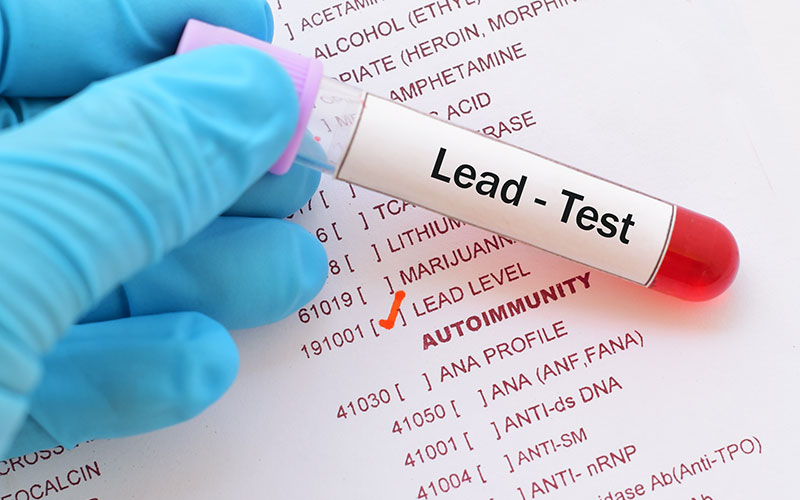
In a violation of state and federal laws, Maine has failed to protect its most vulnerable children from lead poisoning. Photo: IStock
Every day, children in Maine are exposed to lead paint and dust in their homes and to lead-contaminated water in their schools. When left untreated, lead poisoning robs our children of their futures and results in high social and economic costs.
Addressing this public health threat involves a two-pronged approach: We must eliminate these sources of lead and the harmful poisonings they cause. And, we must identify and treat children who have been poisoned already, especially those enrolled in MaineCare (Maine’s Medicaid program). That was the rationale behind state and federal laws passed decades ago that require the State of Maine to test all 1- and 2-year-old children covered by MaineCare for poisoning.
Disturbingly, Maine has failed to meet these legal obligations for years. In 2017, and many years before that, only about half of the 1-year-olds and about one-third of the 2-year-olds enrolled in MaineCare were tested. As a result, our most vulnerable children have been left at risk of lifelong harm from undiagnosed and untreated lead poisoning.
We may never know the heavy toll this failure has already taken on our children, their families, and our communities. We cannot allow the State to continue leaving children in harm’s way. That’s why we are demanding that the State step up and follow the law. It would be far better for it to do so voluntarily, rather than under a court order.
To Protect Our Children, Maine Must Fully Comply with Lead Testing Requirements
Three public health agencies are responsible for complying with the federal and state laws requiring lead testing: the Maine Department of Health and Human Services, the Maine Center for Disease Control and Prevention, and the Office of MaineCare Services. In February, we called on these agencies to account for their repeated legal violations and demanded that the State begin fully complying with the laws. We were joined in our demand by Toxics Action Center and Environmental Health Strategy Center.
The State of Maine does not dispute its legal obligations or that it has been violating the law for years. Indeed, in a 2019 report to the state Legislature, the agencies responsible admit – without qualification – that the State’s legal charge has not, and is not, being met. A Maine Affordable Housing Coalition report, also released in 2019, confirmed these findings.
But acknowledging their obligation – and the failure to meet it – has done nothing to increase screening rates to anywhere close to what the law requires. And it is certainly cold comfort to the hundreds of families whose children went undiagnosed and who may now face a lifetime fallout of the State’s inaction.
Lead Poisoning is Preventable and the State of Maine Already Knows What to Do
What makes the State’s failures even more inexcusable is the fact that lead poisoning is a preventable health issue. Doctors can readily treat it when detected early, making universal testing of MaineCare children essential to eradicating it permanently. In our outreach to the State, we proposed several steps to improve screening rates, including:
- Establishing financial incentives for MaineCare providers to conduct lead screening on all of their 1- and 2-year-old patients,
- Creating and implementing performance incentives for these same providers, contingent on their meeting the testing requirements,
- Educating and providing technical support to providers who are unaware of or unwilling to fulfill the lead screening obligations.
These and other solutions to this longstanding public health problem have been available to the state’s public health agencies for years. Still, they have taken strikingly little action to improve screening rates – either because MaineCare providers lack the incentives, knowledge, or willingness to perform the screening, or because the State lacks the willingness to establish and enforce a program for universal MaineCare screening, or both. That means potentially hundreds of children continue to be poisoned, but untreated, on the State’s watch.
Failure to Screen All MaineCare Children is Creating a Public Health Crisis
Maine’s past and ongoing violations of its lead testing obligations are causing adverse health effects and economic losses. Exposure to lead in young children causes brain damage that can result in learning disabilities and behavioral problems. It also can produce language or speech delays, attention deficits, and lower intelligence.
Lead poisoning also brings high social and economic costs, including enormous and long-lasting health care expenses associated with treating poisoned children. Parental work loss, poorer education, and the lost future earning potentials of poisoned children take a massive economic toll, as well.
We are not alone in our outrage about issues with lead testing for children enrolled in Medicaid programs. In 2019, Maine’s U.S. Senator Angus King and 16 other senators sent a letter to the federal Centers for Medicare and Medicaid Services (CMS) indicating that the failure to screen all Medicaid-eligible children is a “public health crisis.” The senators called on the federal agency to provide information on what it’s doing to fill data gaps and increase screening rates. CMS has yet to reply – a deplorable lapse on the part of an agency tasked with protecting our children’s health.
If Maine Isn’t Following the Law Now, How Will It Comply with New Universal Lead Testing Requirements?
Last year, we applauded when Governor Mills signed into law An Act to Strengthen the Lead Poisoning Control Act (L.D. 1116), which requires that Maine test all 1- and 2-year-olds, not just those enrolled in MaineCare. However, given that state agencies have consistently breached their longstanding obligation to children covered by MaineCare, we are skeptical concerned about the State’s ability to follow through on these ambitious new commitments.
The fact is, our children’s futures are at stake. The costs of continued inaction are too high. Maine must get its house in order and stop violating its legal responsibility to protect our most vulnerable toddlers. Even as we push the State to remedy its previous legal violations, we will be closely monitoring its compliance with the new testing obligations. It’s time for the State not only to talk the talk, but walk the walk when it comes to protecting the most vulnerable among us.



